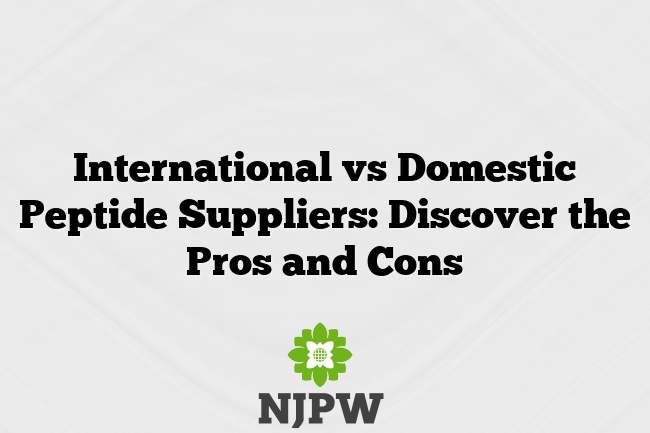Peptides for Weight Loss – The Science-Backed Approach

Peptides have emerged as a promising solution for those seeking a science-backed approach to weight loss. These intriguing compounds, composed of amino acid chains, have demonstrated remarkable potential in supporting various aspects of the weight management process. From enhancing metabolic efficiency to regulating appetite and promoting lean muscle growth, peptides offer a multifaceted approach to achieving and maintaining a healthy weight.
| Peptide | Key Benefits for Weight Loss |
|---|---|
| GLP-1 Agonists | Stimulate insulin secretion, suppress appetite, and slow gastric emptying |
| GHRP-6 | Increase growth hormone production, which can boost metabolism and fat burning |
| CJC-1295 | Enhance the release of growth hormone, leading to improved body composition |
The mechanisms by which peptides support weight loss are multifaceted and well-documented in the scientific literature. MK-677, for instance, works by stimulating the ghrelin receptor, which can lead to increased growth hormone secretion and enhanced fat metabolism. Meanwhile, GLP-1 agonists like liraglutide and semaglutide have been shown to suppress appetite, slow gastric emptying, and improve insulin sensitivity – all of which contribute to successful weight management.
What are Peptides?
Peptides are short chains of amino acids, the building blocks of proteins, that play crucial roles in various physiological processes. These versatile molecules can be found naturally in the human body, as well as synthesized in laboratories for therapeutic and performance-enhancing applications. When it comes to weight loss, certain peptides have garnered significant attention for their ability to influence metabolic pathways, hormone regulation, and body composition.
How do Peptides Support Weight Loss?
Peptides can support weight loss through a variety of mechanisms. Some peptides, such as GLP-1 agonists, work by regulating appetite and satiety signals, leading to reduced caloric intake. Others, like GHRP-6, stimulate the release of growth hormone, which can boost metabolism and promote the burning of fat. Certain peptides, such as CJC-1295, have been shown to enhance muscle growth and lean body mass, which in turn can increase overall energy expenditure.
Key Peptides for Weight Loss
While there are numerous peptides with potential weight loss benefits, some of the most well-researched and promising include:
– GLP-1 agonists (e.g., liraglutide, semaglutide): Suppress appetite, slow gastric emptying, and improve insulin sensitivity
– GHRP-6: Stimulate growth hormone release, leading to increased metabolism and fat burning
– CJC-1295: Enhance growth hormone secretion, promoting lean muscle growth and body composition improvements
– Ipamorelin: Selectively stimulate growth hormone release without significantly increasing cortisol levels
Understanding the Mechanism of Action
The mechanisms by which peptides support weight loss are complex and multifaceted. MK-677, for example, works by activating the ghrelin receptor, which can lead to increased growth hormone secretion and enhanced fat metabolism. GLP-1 agonists, on the other hand, primarily act by suppressing appetite, slowing gastric emptying, and improving insulin sensitivity – all of which contribute to successful weight management.
Proven Benefits of Using Peptides
Numerous studies have demonstrated the efficacy of peptides in supporting weight loss and improving body composition. For instance, research has shown that GLP-1 agonists can lead to significant reductions in body weight, waist circumference, and body fat percentage. Similarly, GHRP-6 and CJC-1295 have been associated with increased lean muscle mass, improved muscle recovery, and enhanced fat-burning capabilities.
Selecting the Right Peptide Supplement
When choosing a peptide supplement for weight loss, it’s important to consider factors such as the specific peptide, the quality of the formulation, and the dosage. It’s also crucial to consult with a healthcare professional to ensure the safe and effective use of these compounds, as they may interact with certain medical conditions or medications.
Optimal Dosage and Usage Guidelines
The optimal dosage and usage guidelines for peptides can vary depending on the specific compound, the individual’s needs, and other factors. Generally, it’s recommended to start with lower doses and gradually increase as needed, closely monitoring the body’s response. It’s also important to follow the instructions provided by the supplement manufacturer or a healthcare professional.
Potential Risks and Safety Considerations
While peptides are generally considered safe when used under the guidance of a healthcare professional, there are some potential risks and safety considerations to be aware of. These may include side effects such as nausea, headaches, or injection site reactions. It’s crucial to carefully research the specific peptide, follow dosage guidelines, and monitor for any adverse effects.
Combining Peptides with Other Weight Loss Strategies
For optimal results, peptides can be combined with other evidence-based weight loss strategies, such as a balanced diet, regular exercise, and lifestyle modifications. By taking a comprehensive approach, individuals can leverage the synergistic benefits of peptides and other interventions to achieve their weight management goals.
The Science Behind Peptides for Weight Management
The science supporting the use of peptides for weight loss is extensive and growing. Numerous studies have explored the various mechanisms by which these compounds can influence metabolic processes, hormone regulation, and body composition. As the research continues to evolve, the role of peptides in weight management is becoming increasingly well-understood and recognized.
Conclusion
Peptides have emerged as a promising and science-backed approach to weight loss, offering a multifaceted solution to the complex challenge of achieving and maintaining a healthy weight. By understanding the mechanisms of action, key peptide compounds, and the optimal usage guidelines, individuals can leverage these versatile molecules to support their weight management goals. As with any supplement or intervention, it’s essential to consult with a healthcare professional and follow a comprehensive approach for the best results.
Frequently Asked Questions
What are the key benefits of using peptides for weight loss?
Peptides can support weight loss through a variety of mechanisms, including regulating appetite and satiety signals, boosting metabolism, promoting lean muscle growth, and improving body composition. Some of the key benefits include reduced caloric intake, increased fat burning, and enhanced overall weight management.
Are there any potential risks or side effects associated with using peptides for weight loss?
While peptides are generally considered safe when used under the guidance of a healthcare professional, there are some potential risks and side effects to be aware of, such as nausea, headaches, or injection site reactions. It’s crucial to carefully research the specific peptide, follow dosage guidelines, and monitor for any adverse effects.
How can peptides be combined with other weight loss strategies for optimal results?
For the best results, peptides can be combined with other evidence-based weight loss strategies, such as a balanced diet, regular exercise, and lifestyle modifications. By taking a comprehensive approach, individuals can leverage the synergistic benefits of peptides and other interventions to achieve their weight management goals.






